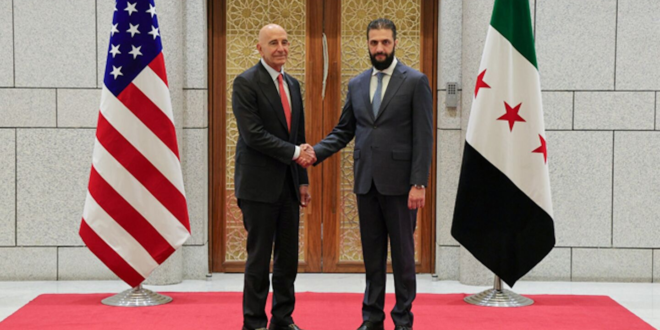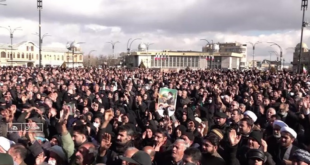President Donald Trump’s point person for Syria says the administration is concerned that Syrian leader Ahmed al-Sharaa’s efforts to promote inclusive governance and engage with the West could make him a target for assassination by disaffected militants.
“We need to coordinate a protection system around [Sharaa],” Ambassador Tom Barrack told Al-Monitor in an interview.
Barrack highlighted the threat posed by splinter factions of the foreign fighters who joined Sharaa in the lightning campaign that toppled former President Bashar al-Assad in early December. As Syria’s new leadership works to integrate these battle-tested fighters into its national army, they are being targeted for recruitment by groups like the Islamic State (ISIS).
The longer it takes to bring economic relief to Syria, “the more fraction groups you’re going to have that are going to say, ‘This is our opportunity to disrupt,’” the US envoy said.
“We need to deter any of those possible enemy assailants before they get there,” Barrack said, adding that would require close cooperation and intelligence sharing among US allies rather than military intervention.
Barrack, who has twice met with Sharaa, described the Syrian president as “bright,” “confident” and “focused.” He downplayed skepticism about Sharaa’s jihadist past, praising him as an impressive communicator with a strong poker face.
“I’m certain that our interests and his interests are exactly the same today, which is to make a success like he did in Idlib of building an inclusive, functioning society that will be soft Islam, not hard Islam,” Barrack said.
Sharaa’s Hayat Tahrir al-Sham, a US-designated terrorist group once linked to al-Qaeda, has been the dominant military force and de facto governing authority in Idlib since establishing control over the northwestern province in 2017. The UN Commission of Inquiry on Syria has reported instances of arbitrary detention, torture and other ill-treatment since Idlib came under HTS control. But in recent years, Sharaa’s group relaxed social restrictions, withdrawing morality police from public areas and easing strict Islamic dress requirements for women. Sharaa also began making public appearances with the region’s Christian and Druze figures, promising to return their confiscated property.
Sunni-majority Syria is home to a mix of religious and ethnic groups, including Christians, Alawites, Kurds and Druze, whose rights Sharaa has said will be protected under the new government.
Revenge killings carried out by pro-government factions, including a wave of sectarian violence in Syria’s coastal Alawite heartland in March, have raised concerns over Sharaa’s ability to maintain order and safeguard the country’s minority populations. But Barrack says Sharaa and his fragile government are managing as well as can be expected under the circumstances.
“I really give these guys a lot of credit for harnessing the resources that they have and keeping their composure at a time where everybody else’s initiative is to try and institute fires that will be attributed to them,” Barrack said.
No conditions, but ‘expectations’
Barrack spoke with Al-Monitor less than a month after Trump met with Sharaa in Riyadh on May 14 and announced he would lift all US sanctions on Syria. It marked a stunning turnaround for US policy, which had been to avoid direct engagement with Sharaa and his interim government.
Barrack, a real estate investor and longtime friend of Trump, was serving as US ambassador to Turkey last month when he took on the added role of special envoy for Syria. The new assignment elevates him as a prominent voice on the Middle East in the Trump administration, where some senior officials had worked to delay or block sanctions relief over Sharaa’s previous ties to al-Qaeda.
Barrack described his mission as preventing “bureaucratic babysitting” from stalling the president’s push for sanctions relief.
“[Trump] made an unbelievable decision on his own just to rip the band-aid off,” Barrack said. “This was Trump being Trump, not his advisers, and it was brilliant.”
Barrack was adamant that there are no conditions tied to the sanctions relief, as was advocated by some in Trump’s administration.
“We are not dictating. We are not giving conditions. We’re not nation-building,” Barrack said. “We’ve done that. It’s never worked.”
Rather than conditions, there are “expectations” of continued transparency as Sharaa follows through on several priorities outlined by Trump during their meeting, Barrack said. The measures include cracking down on Palestinian militants, pursuing the country’s eventual entry into the Abraham Accords and countering the resurgence of ISIS.
On May 23, the Treasury Department issued a general license permitting US citizens and companies to engage in financial transactions with Syrian institutions, including its central bank. The State Department also announced a six-month waiver for sanctions imposed under the 2019 Caesar Syria Civilian Protection Act.
Congressional offices on both sides of the aisle have begun drafting legislation that would rescind the Caesar Act. In the meantime, Barrack said the administration plans to keep extending its waiver until Congress fully repeals the law.
As Al-Monitor first reported, Trump is also expected to sign an executive order this week removing a raft of sanctions imposed on Syria since 1979.
‘Silent understanding’
Barrack pointed to a series of challenges awaiting Sharaa, including merging Syrian Kurdish forces into the national army, integrating his contingent of hard-line foreign fighters, and addressing the sprawling detention camps in northern Syria that hold suspected ISIS members and their families and are considered a breeding ground for radicalization.
Sharaa must also contend with Israel, which has dramatically expanded its ground operations in Syria since Assad’s ouster. The Israeli military has seized control of the 400-square-kilometer (154-square-mile) demilitarized buffer zone in the Golan Heights, carried out limited incursions into southern Syria and conducted airstrikes it says are aimed at preventing weapons from falling into the wrong hands.
Sharaa said he is committed to upholding the 1974 ceasefire agreement with Israel and has hinted at one day normalizing relations between the two countries.
Barrack previously called for a non-aggression pact between Syria and Israel, describing their conflict as a “solvable problem.” Asked by Al-Monitor what steps the United States is taking to facilitate dialogue or build trust between the two sides, he chose his words carefully.
“Our hope is that both of those parties, Israel and Sharaa, even if they don’t talk to each other at this point, will have a silent understanding with each other that engaging (militarily) right now would be a horrible thing for both of them,” Barrack said.
Damascus has made headway on another thorny issue. In mid-March, Sharaa signed a deal with the Syrian Democratic Forces, the Kurdish-led authority that controls the country’s northeast, to merge its forces into the Syrian national army.
Al-Monitor first reported on the exchange of more than 400 prisoners last week between the Syrian government and the US-backed SDF. But unresolved disputes linger, including over control of the strategic Tishreen Dam.
“The only way Syria survives is not to have multiple non-nation states armed and fighting with each other within Syrian territory and to allow all minorities to function with their own cultures, traditions and customs — but as Syrians,” Barrack said.
He cautioned that integration of Syria’s armed forces is rooted in deeper questions of identity, remarking that “it gets down to uniforms.”
‘Flooding the zone’ with hope
For more than a decade, sanctions had isolated Syria from the international financial system and helped push more than 90% of Syrians below the poverty line. Ending them paves the way for the return of international companies to Syria, where one in four people are jobless and the estimated price tag for rebuilding the country is between $250 billion and $400 billion.
Barrack describes the primary US objective in Syria as removing barriers to its economic recovery so that the Gulf states, Turkey and Syrians themselves can step in to create visible signs of progress.
“You want the ability to build your own nation? Go for it,” Barrack said. “All we’re doing is unwrapping the restrictions that stop the flow of good ideas and good people to help.”
The US envoy calls it “flooding the zone with hope.”
“Even if they’re not having more water or more electricity yet, they can see a generator being built,” Barrack said. “At this point, one drop of hope trumps a reservoir of a bad reality.”
 Eurasia Press & News
Eurasia Press & News




